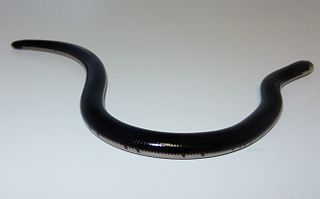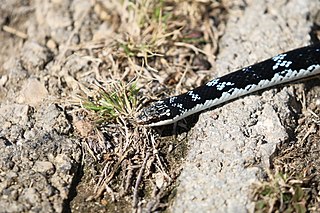
Leptodeira is a genus of colubrid snakes commonly referred to as cat-eyed snakes. The genus consists of 18 species that are native to primarily Mexico and Central America, but range as far north as the Rio Grande Valley region of Texas in United States and as far south as Argentina in South America.

Xenodontinae is a subfamily of snakes in the family Colubridae.

Sibynophis is a genus of nonvenomous colubrid snakes, commonly called many-toothed snakes, which together with Scaphiodontophis make up the subfamily Sibynophiinae.

The Oenpelli python or Oenpelli rock python is a species of large snake in the family Pythonidae. The species is endemic to the sandstone massif area of the western Arnhem Land region in the Northern Territory of Australia. There are no subspecies that are recognised as being valid. It has been called the rarest python in the world. Two notable characteristics of the species are the unusually large size of its eggs and its ability to change colour.
Atractus albuquerquei, commonly known as the Albuquerque ground snake, is a species of small burrowing snake in the family Colubridae. The species is endemic to South America.

Pseudalsophis is a genus of snakes in the family Colubridae. The genus is endemic to South America.

Colubroidea is a superfamily of snakes in the clade Colubroides that includes Colubridae, with some studies splitting Colubridae into multiple families that make up Colubroidea. Historically, Colubroidea also included other caenophidian snakes such as cobras and vipers, as these snakes form a clade. However these groups are now divided into several distinct, but related, families. Zaher et al. (2009) proposed to redefine Colubroidea for colubrids and related families, while designating Colubroides as the group containing vipers and cobras as well as colubroids. The ReptileDatabase considers Colubroidea to be composed of Colubridae and the members of its sister group, Elapoidea, and does not recognize the division of Colubridae into multiple families.

Dipsadinae is a large subfamily of colubroid snakes, sometimes referred to as a family (Dipsadidae). They are found in most of the Americas, including the West Indies, and are most diverse in South America. There are more than 700 species.

Synophis is a genus of snakes in the family Colubridae. The genus is endemic to northwestern South America.

Prosymna is a genus of elapoid snake. It is the only genus in the family Prosymnidae. They were formerly placed as a subfamily of the Lamprophiidae, but have been more recently identified as a distinct family.
Mussurana is a genus of snakes in the family Colubridae. The genus is endemic to South America.
Mussurana bicolor, the two-colored mussurana, is a species of snake in the family Colubridae. The species is native to southern South America.

Lygophis is a genus of snakes in the subfamily Dipsadinae of the family Colubridae. The genus is endemic to Panama and South America.

Amerotyphlops is a genus of snakes in the family Typhlopidae.
Amaral's ground snake is a species of snake in the family Colubridae. The species is endemic to Brazil.

Caraiba is a monotypic genus of snakes in the family Colubridae. The genus contains the sole species Caraiba andreae, also known commonly as the black and white racer or the Cuban lesser racer, which is endemic to Cuba. There are six recognized subspecies.
Rodriguesophis is a genus of snakes in the family Colubridae. The genus contains three species, all of which are endemic to Brazil.

The Colubroides are a clade in the suborder Serpentes (snakes). It contains over 85% of all the extant species of snakes. The largest family is Colubridae, but it also includes at least six other families, at least four of which were once classified as "Colubridae" before molecular phylogenetics helped in understanding their relationships. It has been found to be monophyletic.
Pseudalsophis thomasi, or Thompson's racer, a species of snake in the family Colubridae. It is endemic to several islands in the Galápagos group.
Erythrolamprus festae, also known commonly as the drab ground snake, is a species of snake in the family Colubridae. The species is native to northwestern South America.












